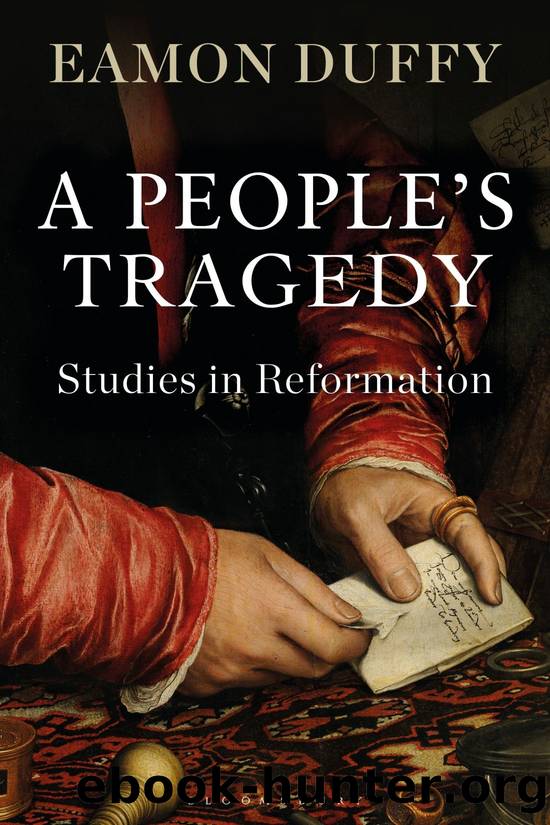A People's Tragedy by Eamon Duffy

Author:Eamon Duffy
Language: eng
Format: epub
ISBN: 9781472983862
Publisher: Bloomsbury Publishing
8
James Anthony Froude and the Reign of Queen Mary
Great historical writing, perhaps all historical writing, holds a mirror up to two different worlds: the age it sets out to describe and the age in which it is written. The historian aims to understand and explain the past. But the questions historians bring to the past often reflect the anxieties and preoccupations of the present. Of no great historical work is this more true than James Anthony Froudeâs monumental 12-volume study of The History of England from the Fall of Wolsey to the Defeat of the Spanish Armada, published between 1858 and 1870.1
Froudeâs intellectual career was stormy even by the contentious standards of Victorian England. Born in 1818, he was the fourth son of a stern West Country parsonage. His father was an old-fashioned high and dry churchman, archdeacon of Totnes from 1820 till his death in 1859; his mother had died two years after James Anthonyâs birth. The future historian was raised in a male-dominated household of rigid discipline and little overt affection, disapproved of at home and bullied at school. He was overshadowed by his brilliant, ebullient and egotistical eldest brother Hurrell, whose idea of toughening his timid and sickly sibling was to lower him head-first into a Devon stream and stir the mud with his hair.2 Before his premature death from tuberculosis in 1836, Hurrell was to become one of the founding fathers of the Tractarian Movement, the Oxford-based clerical ginger group that sought to recover and promote the Catholic aspects of the Anglican tradition. The publication of Hurrell Froudeâs inflammatory and opinionated literary Remains by his friend and admirer John Henry Newman in 1838 was both a turning point in the history of the movement and a staging post on Newmanâs own journey into the Roman Catholic Church.
James Anthony arrived in Oxford just months before his brotherâs death, and fell at once under the spell of Newmanâs magnetic personality. His first historical work was a life of the Saxon St Neot, contributed to a hagiographical series on the English saints edited by the older man. Froude was never to lose his personal reverence for Newman, âone of the ablest of living menâ.3 But he soon found himself repelled by Newmanâs religion, with its emphasis on the importance of dogma and the continuity of Catholic tradition. Unsettled by a Zeitgeist in which traditional religious certainties seemed increasingly contradicted by advances in science and biblical criticism, Froude abandoned what he saw as the hot-house churchiness of Tractarianism. After much agonizing, he took refuge in a self-consciously low-church Protestantism, fiercely patriotic, deeply anticlerical, dismissive of doctrine and ceremonial. Froude emphasized instead religion as moral goodness informed by faith in a providentialist God, known in the course of history by the individual conscience.4 For him, the triumph of the Reformation did not lie in the replacement of a Catholic creed by a Protestant one, for Froude himself had reservations about all creeds. What Henry VIII and his daughter Elizabeth had achieved
Download
This site does not store any files on its server. We only index and link to content provided by other sites. Please contact the content providers to delete copyright contents if any and email us, we'll remove relevant links or contents immediately.
| Africa | Americas |
| Arctic & Antarctica | Asia |
| Australia & Oceania | Europe |
| Middle East | Russia |
| United States | World |
| Ancient Civilizations | Military |
| Historical Study & Educational Resources |
Magic and Divination in Early Islam by Emilie Savage-Smith;(1533)
Papillon by Henry Charrière(1433)
Bohemians, Bootleggers, Flappers, and Swells: The Best of Early Vanity Fair by Bohemians Bootleggers Flappers & Swells- The Best of Early Vanity Fair (epub)(1410)
Ambition and Desire: The Dangerous Life of Josephine Bonaparte by Kate Williams(1390)
Twelve Caesars by Mary Beard(1315)
Operation Vengeance: The Astonishing Aerial Ambush That Changed World War II by Dan Hampton(1164)
What Really Happened: The Death of Hitler by Robert J. Hutchinson(1163)
London in the Twentieth Century by Jerry White(1147)
The Japanese by Christopher Harding(1133)
Time of the Magicians by Wolfram Eilenberger(1126)
Twilight of the Gods by Ian W. Toll(1120)
Lenin: A Biography by Robert Service(1076)
The Devil You Know by Charles M. Blow(1026)
A Social History of the Media by Peter Burke & Peter Burke(977)
Freemasons for Dummies by Hodapp Christopher;(965)
Napolean Hill Collection by Napoleon Hill(943)
Henry III by David Carpenter;(919)
The Rise and Triumph of the Modern Self by Unknown(915)
Richard III (The English Monarchs Series) by Charles Ross(909)
